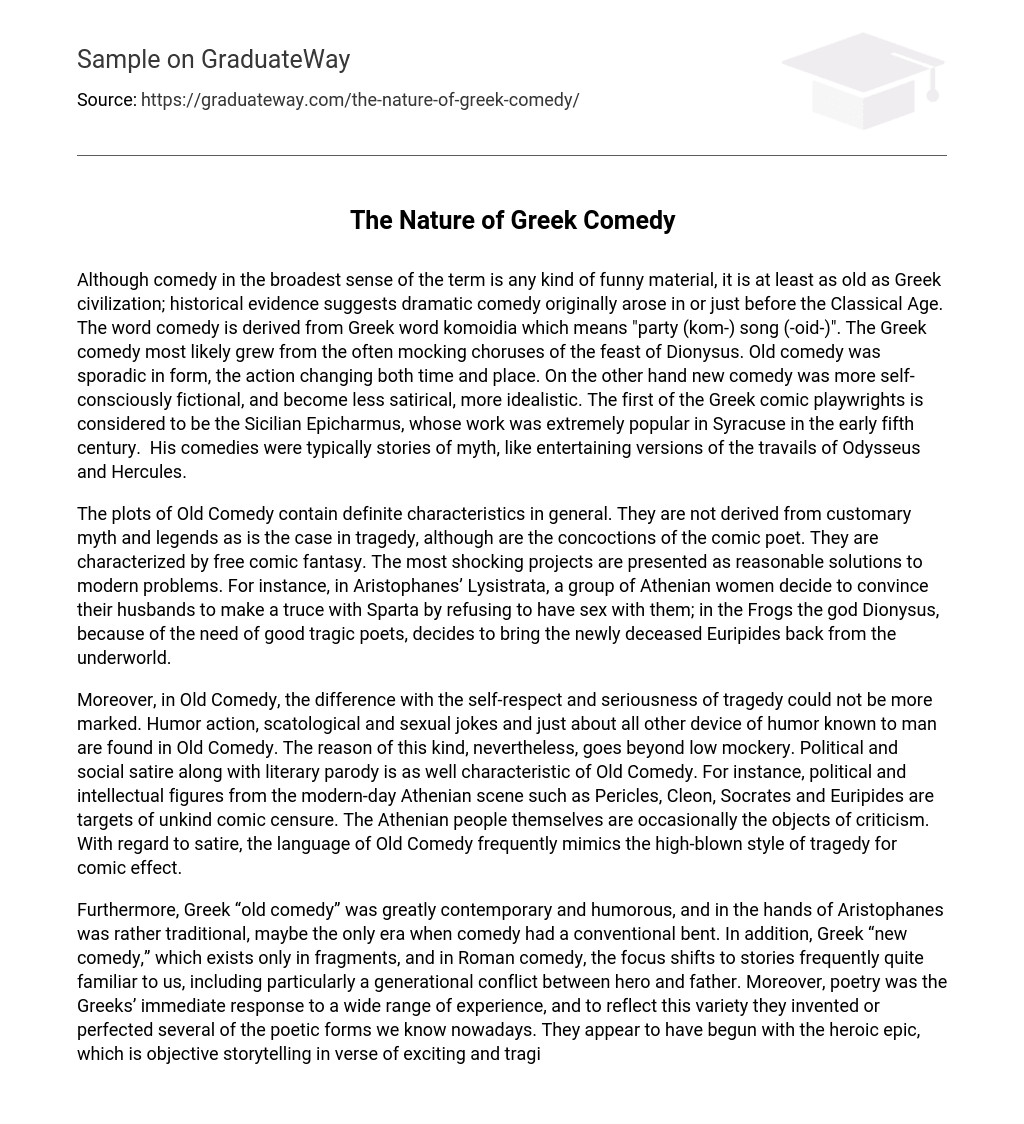Although comedy in the broadest sense of the term is any kind of funny material, it is at least as old as Greek civilization; historical evidence suggests dramatic comedy originally arose in or just before the Classical Age. The word comedy is derived from Greek word komoidia which means “party (kom-) song (-oid-)”. The Greek comedy most likely grew from the often mocking choruses of the feast of Dionysus. Old comedy was sporadic in form, the action changing both time and place. On the other hand new comedy was more self-consciously fictional, and become less satirical, more idealistic. The first of the Greek comic playwrights is considered to be the Sicilian Epicharmus, whose work was extremely popular in Syracuse in the early fifth century. His comedies were typically stories of myth, like entertaining versions of the travails of Odysseus and Hercules.
The plots of Old Comedy contain definite characteristics in general. They are not derived from customary myth and legends as is the case in tragedy, although are the concoctions of the comic poet. They are characterized by free comic fantasy. The most shocking projects are presented as reasonable solutions to modern problems. For instance, in Aristophanes’ Lysistrata, a group of Athenian women decide to convince their husbands to make a truce with Sparta by refusing to have sex with them; in the Frogs the god Dionysus, because of the need of good tragic poets, decides to bring the newly deceased Euripides back from the underworld.
Moreover, in Old Comedy, the difference with the self-respect and seriousness of tragedy could not be more marked. Humor action, scatological and sexual jokes and just about all other device of humor known to man are found in Old Comedy. The reason of this kind, nevertheless, goes beyond low mockery. Political and social satire along with literary parody is as well characteristic of Old Comedy. For instance, political and intellectual figures from the modern-day Athenian scene such as Pericles, Cleon, Socrates and Euripides are targets of unkind comic censure. The Athenian people themselves are occasionally the objects of criticism. With regard to satire, the language of Old Comedy frequently mimics the high-blown style of tragedy for comic effect.
Furthermore, Greek “old comedy” was greatly contemporary and humorous, and in the hands of Aristophanes was rather traditional, maybe the only era when comedy had a conventional bent. In addition, Greek “new comedy,” which exists only in fragments, and in Roman comedy, the focus shifts to stories frequently quite familiar to us, including particularly a generational conflict between hero and father. Moreover, poetry was the Greeks’ immediate response to a wide range of experience, and to reflect this variety they invented or perfected several of the poetic forms we know nowadays. They appear to have begun with the heroic epic, which is objective storytelling in verse of exciting and tragic events. They followed this with a more private, more emotional poetry, which was sung to the lyre and is called lyric for this reason. At their high noon the Greeks invented both tragedy and comedy, the first dealing with the darker and more hard relationships among the gods and men, the second viewing with mocking ribaldry all manner of human foibles.
References:
Bates, Alfred. The Drama: Its History, Literature and Influence on Civilization, Vol. 1, 1906. pp. 28-29.
Duckworth, George. The Nature of Roman Comedy. Princeton: Princeton
University Press, 1952.
Grant, M, ed. Greek Literature: An Anthology. Harmondsworth: Penguin, 1990 [1973].
John R. Theatre in Ancient Greek Society. London: Routledge.
1994.





